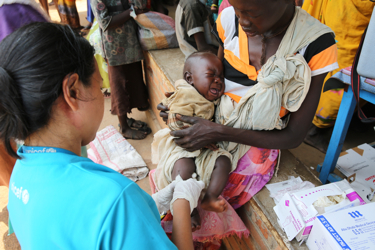(只有英文)逃離南蘇丹的暴力:生活飄泊無定,家庭支離破碎
2016-07-06
© UNICEF South Sudan/2016/Irwin
Nedal, 15, and her two younger others are living with a foster family in a displacement site in Wau, South Sudan. They were separated from their parents when fighting oke out in the city on 24 June.
(只提供英文版本)
By Tim IrwinRecent violence in South Sudan has displaced some 65,000 people in and around Wau town. Among them are many children who became separated from their parents as their families fled. Reunification is the goal, but first carers must be found for these unaccompanied children.
WAU, South Sudan/ HONG KONG, 6 July 2016 – When they heard the gunfire they knew they had to run. One fled alone, another with her others and another with his children and grandchildren.
All of them were at home in the town of Wau in north-western South Sudan when fighting oke out on 24 June. And they are now among the estimated 65,000 people who have been uprooted.
Finding carers for a child all alone
Christina, 16, is sheltering in a settlement next to the base of the United Nations mission in Wau. She was at home by herself the morning the fighting started. When she ventured outside during a lull in the shooting she saw that all her neighbours had already fled. Alone and frightened, she ran into the bush. Later, she saw a group of people walking towards the base and joined them.

© UNICEF South Sudan/2016/Irwin Christina, 16, has been living at the UNICEF registration center in the main displacement site in Wau, South Sudan. She doesn’t know where her parents or siblings are.
“I’m not used to being alone”, she said in a voice so soft it’s barely audible. “I don’t know what to do.”
Helping neighbours help children
Wau’s grand Cathedral and its surrounding buildings have also been turned into a displacement site where some 10,000 people are now living in whatever space they can find. Nedal, 15, and her two younger others arrived late in the day on the 24th after getting separated from their parents in the panic that gripped their community.
Through the UNICEF registration centre at the site, they found neighbours living in another part of the grounds and are now living with a foster family. A government social worker, himself living in the camp, volunteers at the centre and regularly checks in with the three children.
“Finding families willing to care for the children who are completely on their own is the most pressing need right now”, said Shafeeq Ur Rehman, UNICEF’s Chief of the Wau field office. “Everyone in these sites is struggling to survive and being responsible for an extra child places an additional burden on them. We need to help them so they can help the children.”
UNICEF has also created spaces inside the displacement sites where children can come to play and socialize and where social workers are on hand to support the often distressed youngsters.
As of 3 July, UNICEF has registered 31 children who are on their own within Wau town, and 297 who have lost track of their parents but are living with relatives or other caregivers. An additional 130 children have been reported missing by their parents.
Seeking safety in the bush
When Sebit Bernado heard the fighting his first thought was to seek safety in his native village. He fled with nothing but a small satchel, and for two days he and his family walked through deep bush to reach Mboro. But even there, residents feared the violence would spread, and slept in the forest so as to go unnoticed.

© UNICEF South Sudan/2016/Irwin Hundreds of children were immunized and treated for malnutrition when UNICEF and partners travelled to the village of Wau to assist displaced persons.
Several thousand people were gathered near an abandoned church when UNICEF and partners arrived to provide health services and high-energy therapeutic food for malnourished children. When the supplies had been distributed, families walked along dirt tracks before disappearing again into the trees.
Sebit’s four grandchildren were among the hundreds of children to be immunized in Mboro. He said he worries about them living like this and is thinking about returning to Wau, but not to his house. “We may go back to live in the UN settlement”, he said. “It’s a hard life living in the bush, but at least we are alive. Back home, who knows.”









